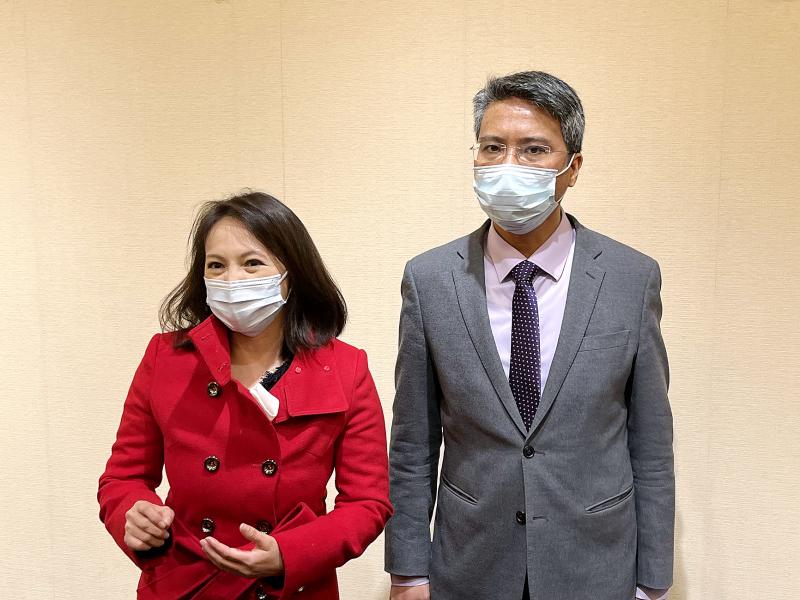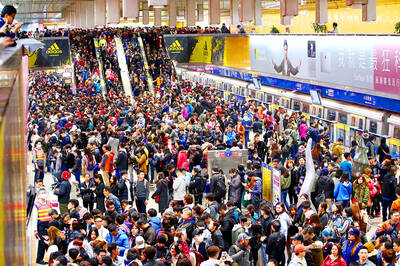The Council of Grand Justices on Monday heard a legal debate on whether it is unconstitutional to place limitations on recognizing the offspring of a marriage between a Han and an indigenous person as an indigenous person.
Wu Hsin-yang (吳欣陽), a lawyer, and his spouse, Cheng Chuan-ju (鄭川如), a Truku associate professor of law at Fu Jen Catholic University, said that certain provisions in the Status Act for Indigenous Peoples (原住民身分法) contravened the Constitution.
Wu and Cheng were campaigning on behalf of their seven-year-old daughter, Wu Juo-shao (吳若韶), whom they hope to register as an indigenous person.

Photo: CNA
Lawyer Ma Jun-ming (馬潤明), representing the couple, said that if one could trace their ancestry back to an indigenous community, they are natural-born indigenous people and that it is not a status that should be “given” by the state.
The current provision that the offspring of an ethnic Han and an indigenous person must take the family name of the male or female indigenous parent to be able to apply for indigenous status is an act of interference on the part of the state, Ma said.
This restriction places limitations on the Constitution and infringes on the rights of a person, he added.
Caligat Gadu, representing the Council of Indigenous Peoples, said that amendments to the Constitution, the UN’s Declaration on the Rights of Indigenous Peoples and other international treaties take the position that all affairs regarding indigenous peoples should be discussed within the indigenous community.
All indigenous legislators had participated in the drafting of the Status Act for Indigenous Peoples and had supported its passage through the Legislative Yuan, Gadu said, adding that bloodline should not be the sole consideration for determining a person’s ethnicity.
The Council of Indigenous Peoples cited recent statistics showing that 65 percent of descendants of families in which the father is of Han ethnicity and the mother of indigenous ethnicity are willing to assume traditional indigenous names or adopt their mother’s surname at birth.
That compares with 5 percent of citizens of other ethnicities who are willing to take their mother’s maiden family name, which shows that the Status Act for Indigenous People can better promote gender quality, it said.
Control Yuan Human Rights Committee member Upay Radiw Kanansaw (鴻義章) said that the country’s recognition of indigenous status depends on the ancestry of the individual and whether they identified as indigenous.
It should not be a status given just because one registers for it, Kanansaw said, adding that he does not think that existing regulations contravene the Constitution.
Lawyer Lin Wei-han (林韋翰) said the government had, in the past, deprived indigenous people of their culture, language, historic memories and naming conventions for what seemed to be for the “better good.”
Even now, the law still denies the “traditional grounds,” traditional living methods, political institutions and legal systems of indigenous people.
Any restrictions placed upon indigenous people, even if it is said to be for their good, diminishes their right to be indigenous, Lin said.
The Council of Grand Justices is expected to rule on the case next month.

People can take the Taipei MRT free of charge if they access it at Nanjing Sanmin Station or Taipei Arena Station on the Green Line between 12am and 6am on Jan. 1, the Taipei Department of Transportation said on Friday, outlining its plans to ease crowding during New Year’s events in the capital. More than 200,000 people are expected to attend New Year’s Eve events in Taipei, with singer A-mei (張惠妹) performing at the Taipei Dome and the city government’s New Year’s Eve party at Taipei City Hall Plaza, the department said. As people have tended to use the MRT’s Blue or

Taipei is participating in Osaka’s Festival of Lights this year, with a 3m-tall bubble tea light installation symbolizing Taiwan’s bubble tea culture. The installation is designed as a bubble tea cup and features illustrations of Taipei’s iconic landmarks, such as Taipei 101, the Red House and North Gate, as well as soup dumplings and the matchmaking deity the Old Man Under the Moon (月下老人), affectionately known as Yue Lao (月老). Taipei and Osaka have collaborated closely on tourism and culture since Taipei first participated in the festival in 2018, the Taipei City Department of Information and Tourism said. In February, Osaka represented

Taiwanese professional baseball should update sports stadiums and boost engagement to enhance fans’ experience, Chinese Professional Baseball League (CPBL) commissioner Tsai Chi-chang (蔡其昌) told the Liberty Times (sister paper of the Taipei Times) in an interview on Friday. The league has urged Farglory Group and the Taipei City Government to improve the Taipei Dome’s outdated equipment, including relatively rudimentary television and sound systems, and poor technology, he said. The Tokyo Dome has markedly better television and sound systems, despite being 30 years old, because its managers continually upgraded its equipment, Tsai said. In contrast, the Taipei Dome lacked even a room for referees

Civil society groups yesterday protested outside the Legislative Yuan, decrying Chinese Nationalist Party (KMT) efforts to pass three major bills that they said would seriously harm Taiwan’s democracy, and called to oust KMT caucus whip Fu Kun-chi (傅?萁). It was the second night of the three-day “Bluebird wintertime action” protests in Taipei, with organizers announcing that 8,000 people attended. Organized by Taiwan Citizen Front, the Economic Democracy Union (EDU) and a coalition of civil groups, about 6,000 people began a demonstration in front of KMT party headquarters in Taipei on Wednesday, organizers said. For the third day, the organizers asked people to assemble